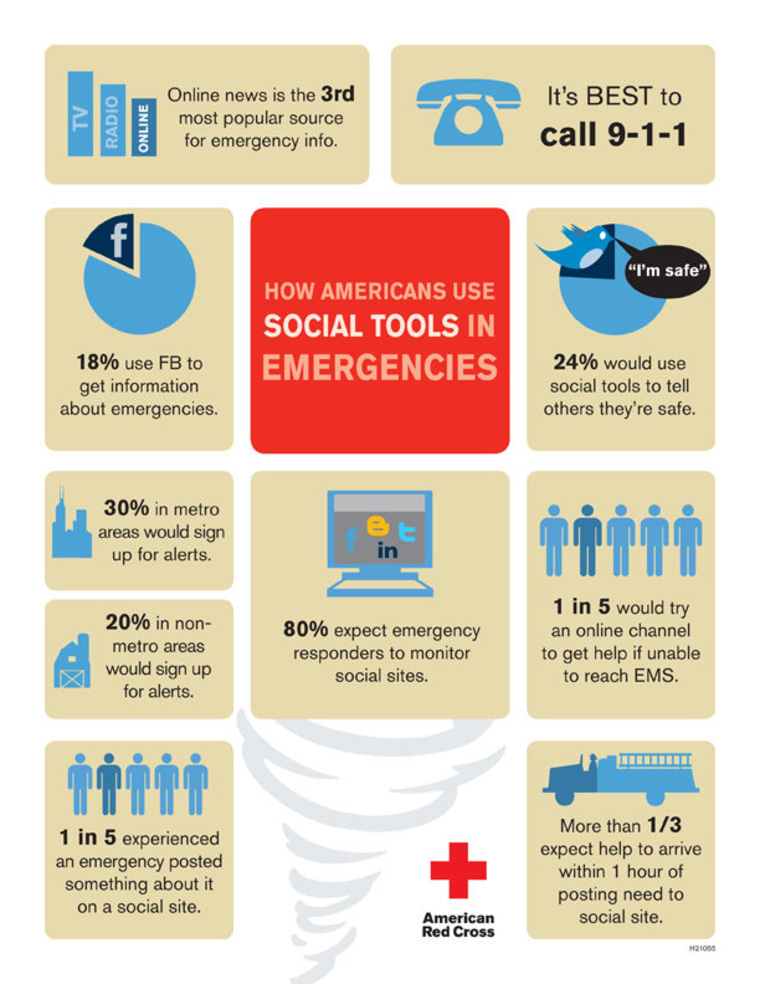When disaster strikes, emergency trackers and responders realize people are probably more likely to reach for their phones or computers to text, tweet and update their status on Facebook and look for ways to get and give help. Because of that, national agencies are continuing to develop ways to better integrate social media into their plans.
In a half-hour, live-streamed talk hosted by Facebook, representatives from the American Red Cross, National Weather Service and Department of Health and Human Services emphasized the importance of social media, especially after Tuesday's earthquake jammed phone lines and impending Hurricane Irene, which could become a Category 4 storm.
While agencies are fully aware of social media's power to convey information as disaster unfolds and in its aftermath — Joplin was touted as a successful example — they're preaching to people to use it before the worst happens, to prepare for it. They can have at the ready evacuation routes, shelters and safety tips. And lists. Lots of to-do lists, emergency kits.
Trevor Riggen, American Red Cross director of mass care, used himself as an example. In response to Tuesday's 5.8 tremors, the first thing he did, he said, was to text his wife and family that he was OK, and post that status on Facebook. He also ran down the results of two recent surveys the Red Cross conducted, which polled 1,011 telephone respondents and 1,046 online respondents in June:
- Followed by television and local radio, the internet is the third most popular way for people to gather emergency information with 18 percent of both the general and the online population specifically using Facebook for that purpose;
- Nearly a fourth (24 percent) of the general population and a third (31 percent) of the online population would use social media to let loved ones know they are safe;
- Four of five (80 percent) of the general and 69 percent of the online populations surveyed believe that national emergency response organizations should regularly monitor social media sites in order to respond promptly;
- For those who would post a request for help through social media, 39 percent of those polled online and 35 of those polled via telephone said they would expect help to arrive in less than one hour.
When asked by participants who sent in questions about whether the Red Cross has been able to meet the demands of responding within an hour, Riggen said that's not happening — yet. He said that while the agency is using a variety of platforms, it's an "enormous challenge" to monitor the volume of social media traffic out there. But Riggen did advocate for being prepared ahead of time by downloading useful apps before they're needed. Both the Red Cross and National Weather Service have such apps.
He also shared how the Red Cross is working on developing open-source street mapping with partners like Ushahidi, which had a powerful effect in Haiti by harnessing the strength of crowdsourcing there for information, he said.
Riggen mentioned a free mobile application that provides shelter locations (available through the Apple App store). There is another, the "American Red Cross SOS" app, that teaches First Aid and CPR (available in Android Market).
The Safe and Well site is another Riggen mentioned for the public to know. It's a site where people can register information about whether they're safe and update their social media status.
Joining Riggen was Laura K. Furgione, National Weather Service deputy director. A meteorologist, she left most of the social media questions to Riggen and Stacy Elmer, of the Department of Health and Human Services.
Furgione perked up when talking about how the National Weather Service, which has a little over 72,000 "likes," picked up 15,000 additional "likes" on Tuesday for the Hurricane Center on Facebook. She said 122 of the agency's forecast offices have Facebook pages. And she encouraged folks to keep sending information as the agency's eyes and ears on the ground, as that helps in developing forecasts.
Not that it should surprise, but all three guests laid on the Facebook adulation, and no mention was made really beyond Facebook, Twitter and Foursquare. (Sorry, G+!) Facebook does have a Global Disaster Relief page that aims to consolidate emergency resources.
Elmer spent most of her time talking about a contest by her agency that will award up to $10,000 to a developer who comes up with an app to plan and set up an emergency network with "lifelines" with designated posting and checking in duties ahead of the need. Ideally, the app would help " decompress communications systems...so people who really need phonelines can use."
She said anyone could apply for the contest, which will have two other awards valued at $5,000 and $1,000.
"It's a really exciting opportunity for Joe Schmo in his basement who likes eating Cheetohs all day," Elmer added.
Related stories:
- Quake bolsters calls for public safety wireless network
- Be ready with disaster preparedness apps
- Soon, you'll be able to send text, video 911 messages
- Earth moves, love happens
- East coast earthquake beat bin Laden (in tweets per second)
- Twitter uses #earthquake to mock Nature's wrath, you
- Small quake has big reach
Check out Technolog on Facebook, and on Twitter, follow Athima Chansanchai, who is also trying to keep her head above water in the Google+ stream.
.
